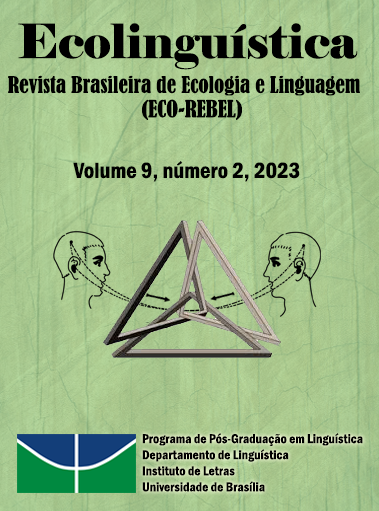O calendário sociocultural do sítio histórico e patrimônio cultural Kalunga: um diálogo entre os saberes tradicionais e a Linguística Ecossistêmica
Keywords:
Calendário Sociocultural; Linguística Ecossistêmica; Sítio Histórico; Patrimônio Cultural Kalunga.Abstract
O artigo tem como objetivo discutir a proposta de um Calendário Sociocultural para apoio e fortalecimento de políticas públicas educacionais direcionadas às unidades escolares pertencentes ao Sítio Histórico e Patrimônio Cultural Kalunga (SHPCK). O calendário servirá de base e consulta ao trabalho dos educadores do e no campo. Ele segue a orientação da Educação do Campo e da Ecolinguística (Linguística Ecossistêmica). A metodologia pauta-se na etnografia como uma ação que nos ajuda a compreender a cultura de um povo em seu ambiente natural. Tal perspectiva reafirma os caminhos de luta e de (re)construção do fazer científico, nos quais o pesquisador atua como agente de transformação no seio de sua comunidade. Para fundamentar os apontamentos desse calendário, foi necessário retomar os estudos de Cunha (2018), realizado no Mestrado Profissional em Sustentabilidade junto a Povos e Terras Tradicionais (MESPT/UnB), que teve como resultado a criação do Calendário Agrícola da Comunidade Vão de Almas. Espera-se que o diálogo sobre o Calendário Sociocultural do SHPCK possa subsidiar a reconstrução do calendário escolar no território Kalunga para uma educação quilombola que fomente uma nova proposta de letramento escolar, bem como valorizar os saberes linguísticos e tradicionais.
Downloads
Published
Issue
Section
License

This work is licensed under a Creative Commons Attribution-NonCommercial-NoDerivatives 4.0 International License.
Authors who publish in this journal agree to the following terms:
Authors retain copyright and grant the journal the right of first publication. The work is simultaneously licensed under the Creative Commons Attribution License allowing the sharing of the work with acknowledgment of the authorship of the work and initial publication in this journal.
Authors are authorized to enter into additional contracts separately for non-exclusive distribution of the version of the work published in this journal (e.g., publishing in institutional repositories or as book chapters), with acknowledgment of authorship and initial publication in this journal.
Authors are allowed and encouraged to post and distribute their work online (e.g., in institutional repositories or on their personal page) at any point before or during the editorial process, as this can bring about productive revisions as well as increase impact.
Citation of published works (See The Effect of Free Access).



3.png)



